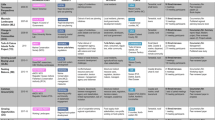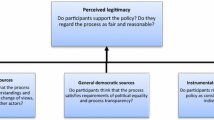Abstract
Participatory processes are often intended to encourage inclusion of multiple perspectives in defining management means and goals. However, ideas about the legitimacy of certain uses and users of the resources can often lead to exclusion from participation. In this way, participation can be transformed from a process of inclusion of various resource users to one of exclusion. Using a case study from a marine protected area in Loreto, Baja California Sur, Mexico, and drawing on work in deliberative democracy, I present a typology of how individuals and groups can be excluded from participation. External exclusion includes non-invitation and other means for keeping participation from occurring. Internal exclusion refers to exclusionary events during participatory meetings. This analysis suggests that participation needs to be recognized as a valuable but easily manipulated tool in the design of projects like natural resource management.
Similar content being viewed by others
Notes
Following local practice in Loreto, commercial fishing refers to small-scale, artisinal fishing, while industrial fishing involves large ships with larger crews and harvests.
This trust lasted for the duration of the management plan negotiations, though later dissolved under the strain of waiting for the final plan to be published (Peterson 2005). Yet some of the external exclusions were alleviated, as fishermen finally received invitations to planning meetings.
References
Agrawal, Arun, and Krishna Gupta. 2005. Decentralization and participation: The governance of common pool resources in Nepal’s Terai. World Development 33: 1101–1114.
Arnstein, Sherry R. 1969. A ladder of citizen participation. Journal of the American Planning Association 35: 216–224.
Baiocchi, Gianpaolo. 2003. Participation, activism, and politics: The Porto Alegre experiment. In Deepening democracy: Institutional innovations in empowered participatory governance, ed. Archon Fung, and Erik Olin Wright. New York: Verso Press.
Botchway, Karl. 2001. Paradox of empowerment: Reflections on a case study from Northern Ghana. World Development 29: 135–153.
Carlsson, Lars, and Fikret Berkes. 2005. Co-management: Concepts and methodological implications. Journal of Environmental Management 75: 67–76.
Cleaver, Frances. 1999. Paradoxes of participation: Questioning participatory approaches to development. Journal of International Development 11: 597–612.
Crosby, Harry. 1984. Antigua California: Mission and colony on the peninsular frontier, 1697–1768. Albuquerque: University of New Mexico Press.
Eversole, Robyn. 2003. Managing the pitfalls of participatory development: Some insight from Australia. World Development 31: 781–795.
Geoghegan, Tighe, and Yves Renard. 2002. Beyond community involvement: Lessons from the insular Caribbean. Parks 12: 16–27.
Gundersen, Adolf G. 2000. The Socratic citizen: A theory of deliberative democracy. Lanham: Lexington Books.
Hanna, Susan. 2003. Transition in the American fishing commons: Management problems and institutional design challenges. In The commons in the new millenium: Challenges, adaptations, ed. N. Dolsak, and E. Ostrom. Cambridge: MIT Press.
Jentoft, Svein. 2007. In the power of power: The understated aspect of fisheries and coastal management. Human Organization 66: 426–437.
Kaplan, Ilene M., and Bonnie J. McCay. 2004. Cooperative research, co-management and the social dimension of fisheries science and management. Marine Policy 28: 257–258.
Kessler, Brianne L. 2004. Stakeholder participation: A synthesis of current literature. Santa Cruz, California: National Marine Protected Areas Center. http://mpa.gov/pdf/publications/Stakeholder_Synthesis.pdf.
Kumar, Sanjay. 2002. Does “participation” in common pool resource management help the poor? A social cost-benefit analysis of joint forest management in Jharkhand, India. World Development 30: 763–782.
Michener, Victoria J. 1998. The participatory approach: Contradiction and co-option in Burkina Faso. World Development 26: 2105–2118.
Moore, Donald S. 1993. Contesting terrain in Zimbabwe’s eastern highlands: Political ecology, ethnography and peasant resource struggles. Economic Geography 69(4): 380–401.
O’Neil, Ann, and Don O’Neil. 2001. Loreto, Baja California, first mission and capital of Spanish California. Studio City: Tio Press.
Parkins, John R., and Ross E. Mitchell. 2005. Public participation as public debate: A deliberative turn in natural resource management. Society & Natural Resources 18: 529–540.
Peterson, Nicole D. 2005. Casting a wide net: Decision-making in a Mexican marine park. Ph.D. dissertation. La Jolla: University of California, San Diego.
Pomeroy, Robert S., John Parks, Richard Pollnac, Tammy Campson, Emmanuel Genio, Cliff Marlessy, Elizabeth Holle, Michael Pido, Ayut Nissapa, Somsak Boromthanarat, and Nguyen Thu Hue. 2007. Fish wars: Conflict and collaboration in fisheries management in Southeast Asia. Marine Policy 31: 645–656.
Pretty, Jules N. 1995. Participatory learning for sustainable agriculture. World Development 23: 1247–1263.
Sen, Sevaly, and Jesper Raakjaer Nielsen. 1996. Marine co-management: A comparative analysis. Marine Policy 20: 405–418.
Tuler, Seth, and Thomas Webler. 1999. Voices from the forest: What participants expect of a public participation process. Society & Natural Resources 12: 437–453.
Walley, Christine. 2004. Rough waters: Nature and development in an East African marine park. Princeton: Princeton University Press.
Wester, Philippus, Douglas J. Merrey, and Marna de Lange. 2003. Boundaries of consent: Stakeholder representation in river basin management in Mexico and South Africa. World Development 31: 797–812.
White, Sara. 1996. Depoliticizing development: The uses and abuses of participation. Development in Practice 6: 6–15.
World Bank. 2008. The World Bank participation sourcebook. http://www.worldbank.org/wbi/sourcebook/sbhome.htm. Accessed 19 April 2008.
Young, Iris Marion. 2002. Inclusion and democracy. New York: Oxford University Press.
Acknowledgments
I wish to thank the fishermen, park officials, and others in Loreto who are as much responsible for this research as I am, though not for its faults. In addition, I would like to acknowledge the support and comments of my fellow panelists at the American Anthropological Association Meetings in 2007, including Carla Roncoli, Renzo Taddei, Scott Lacy, and Kent Glenzer, as well as comments by two anonymous reviewers. Funding for field research in Mexico was generously provided by the University of California Institute for Mexico and the United States (UC MEXUS) and the UC San Diego Anthropology Department. Additional support was provided by the Center for US-Mexican Studies (CUSMEX), the Center for Iberian and Latin American Studies at UC San Diego, and the Center for Research on Environmental Decisions at Columbia University.
Author information
Authors and Affiliations
Corresponding author
Rights and permissions
About this article
Cite this article
Peterson, N.D. Excluding to include: (Non)participation in Mexican natural resource management. Agric Hum Values 28, 99–107 (2011). https://doi.org/10.1007/s10460-010-9258-x
Accepted:
Published:
Issue Date:
DOI: https://doi.org/10.1007/s10460-010-9258-x




